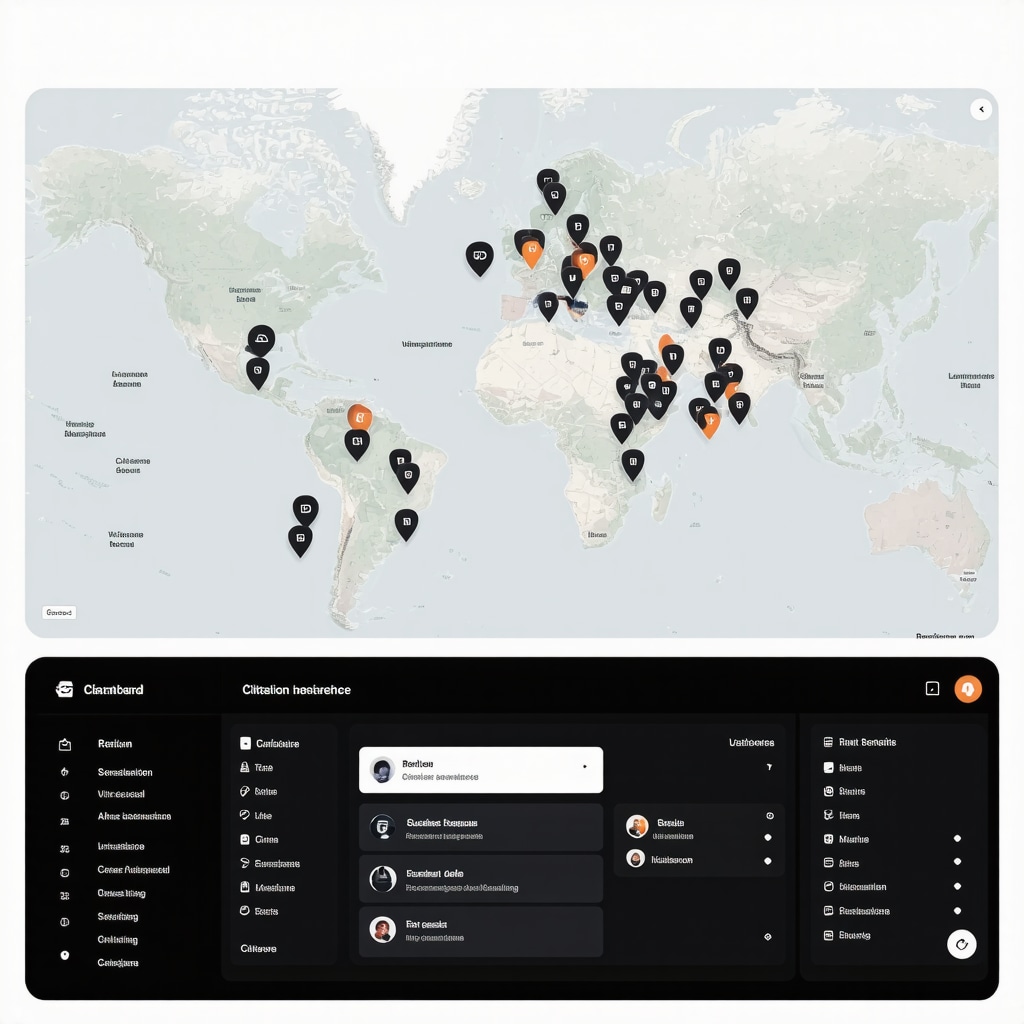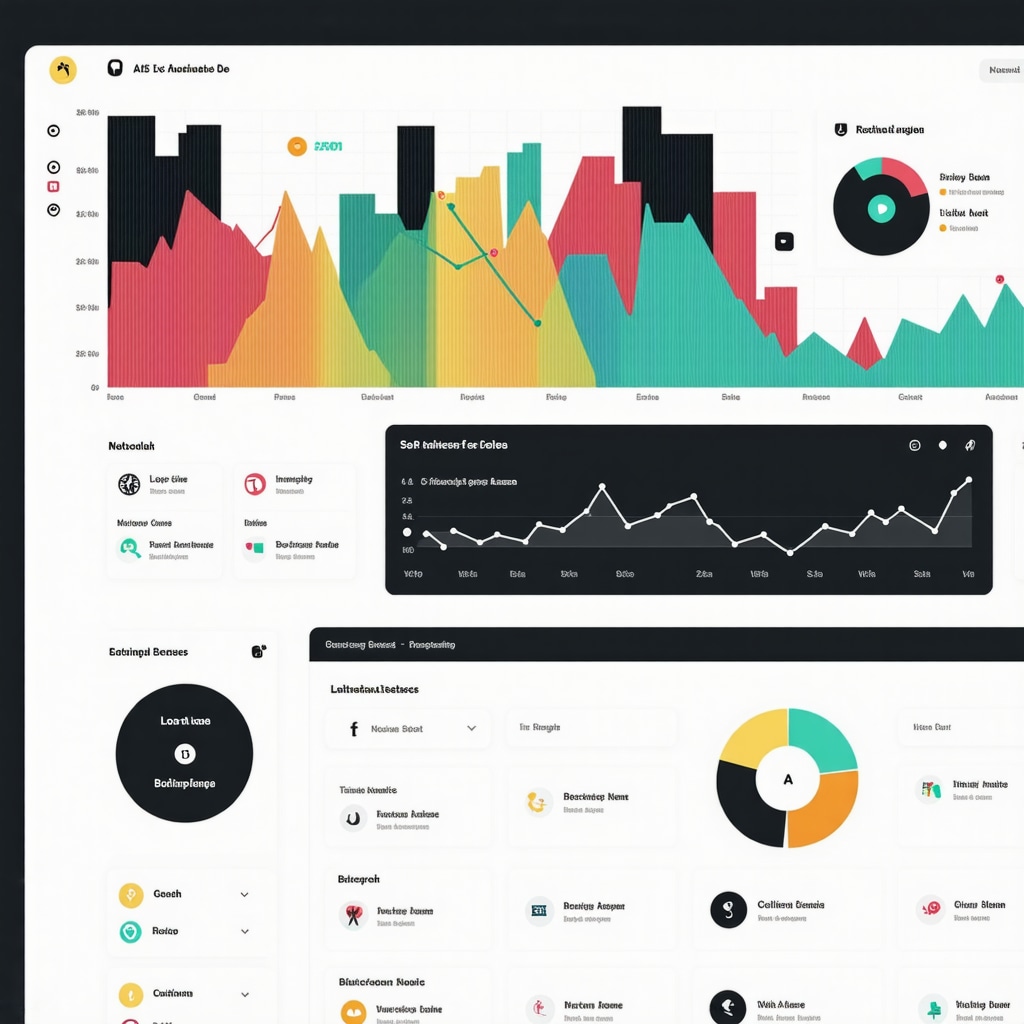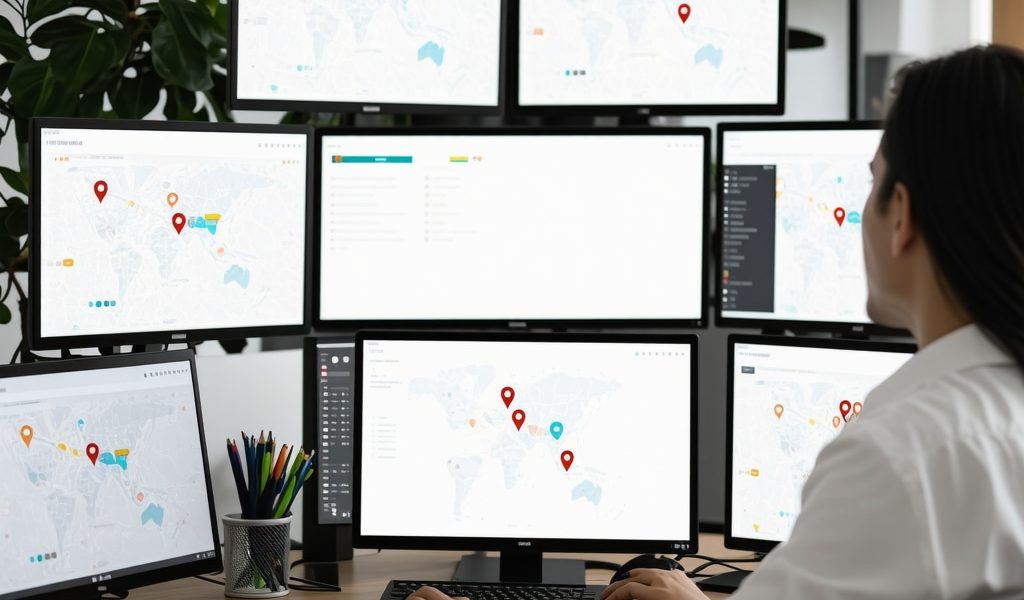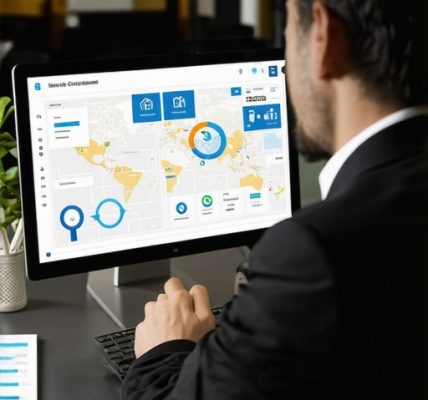Unlocking the Power of GMB Citations: Why Consistency is Your Local SEO Secret Weapon
In the fiercely competitive world of local search, Google My Business (GMB) citations serve as critical signals that can dramatically influence your visibility and rankings. Yet, many businesses underestimate the impact of meticulously managing these citations. A citation, simply put, is any online mention of your business’s name, address, and phone number (NAP). When these details are consistent and accurate across multiple platforms, Google gains confidence in your business’s legitimacy and relevance, propelling you higher in local search results.
Imagine a local bakery whose address varies slightly across directories—sometimes “123 Main St,” other times “123 Main Street.” This inconsistency confuses search engines and customers alike, diluting ranking potential and trust. Managing GMB citations effectively means harmonizing these details to create a unified digital footprint that search engines and users can rely on.
Strategic Citation Building: Beyond Quantity to Quality and Relevance
Not all citations are created equal. While volume can help, the quality and relevance of citation sources are paramount. Target reputable, industry-specific directories, local chambers of commerce websites, and trusted review platforms. These authoritative citations carry more weight with Google’s algorithm, enhancing your local SEO stature.
For instance, a boutique law firm will benefit more from citations on legal directories and local bar association sites than from generic listings. This targeted approach ensures that your GMB profile is surrounded by contextually relevant signals, reinforcing your position in niche local searches.
How Can You Efficiently Maintain Citation Accuracy Across Multiple Platforms?
Managing citations manually can be daunting, especially for businesses with multiple locations or frequently changing details. Utilizing specialized citation management tools such as Moz Local or BrightLocal can automate the monitoring and updating process. These tools scan the web for inconsistencies, enabling swift corrections to prevent ranking penalties.
Additionally, adopting a centralized data repository for your NAP information ensures that every platform draws from the same accurate source. This proactive strategy minimizes errors and fosters a strong, consistent online presence.
Expert Tips to Leverage GMB Citation Management for Maximum Local Impact
- Audit Regularly: Conduct quarterly citation audits to identify discrepancies early and fix them before they impact rankings.
- Claim and Optimize Listings: Ensure you claim your business on all relevant directories and optimize profiles with complete, keyword-rich descriptions and up-to-date contact info.
- Monitor Reviews and Engagement: Citations often link with reviews; responding promptly enhances your reputation and signals engagement to Google.
- Use Local Schema Markup: Implement structured data on your website to reinforce citation information and improve search engine comprehension.
From Theory to Practice: A Real-World Case Study
A mid-sized dental clinic in Chicago improved its local Google rankings significantly by implementing a rigorous citation management strategy. They audited over 50 citation sources, corrected inconsistent NAP information, and focused on niche dental directories. Within six months, their GMB profile climbed into the coveted top 3 local pack for targeted keywords, driving a measurable increase in appointment bookings.
For businesses aiming to replicate such success, integrating citation management with comprehensive GMB SEO tactics is essential. Explore mastering GMB citation management for enhanced local SEO results to deepen your approach.
To further elevate your local business presence and stay ahead in Google’s local search ecosystem, dive into expert strategies that encompass holistic GMB optimization at effective GMB citation management for stronger local SEO.
If you found these insights helpful, share your experiences or questions about citation management in the comments below — your engagement helps build a community of informed local business owners.
Authoritative insights on the importance of NAP consistency can be found in Moz’s Local SEO guide, a definitive resource for local search optimization (Moz Local SEO Guide).
Harnessing Technology: Automating Citation Monitoring to Prevent Ranking Loss
In the dynamic landscape of local SEO, manual citation tracking often falls short due to the sheer volume and frequency of changes across platforms. Embracing automation tools not only streamlines citation management but also significantly reduces the risk of outdated or inconsistent information undermining your Google My Business performance.
Platforms like BrightLocal and Moz Local provide comprehensive dashboards to track your citations’ status, identify inconsistencies, and even suggest relevant new citation opportunities tailored to your industry and location. Integrating these tools with your routine SEO workflow ensures your NAP data remains synchronized, enabling you to respond proactively to any discrepancies.
Prioritizing Citation Quality: How to Identify and Secure Authoritative Listings
While quantity of citations can influence local rankings, authoritative and niche-specific citations wield superior SEO weight. Identifying high-value citation sources requires a nuanced approach: evaluate domain authority, relevance, and trust signals of directories and platforms before committing resources.
For example, a local fitness center may gain more traction from citations on health and wellness directories, local sports clubs, and regional business bureaus than from generic business listings. Securing these targeted citations involves claiming listings, verifying ownership, and optimizing profiles with precise, keyword-rich descriptions and high-quality images, which collectively boost Google’s confidence in your business’s relevance and expertise.
What are the Best Practices for Updating Citations When Business Details Change?
Changes in your business information—whether relocation, rebranding, or contact updates—can disrupt citation consistency and adversely affect local SEO if not managed carefully. Best practices for updating citations include:
- Immediate Updates: Prioritize updating your GMB profile first, as it is the central source of truth for Google.
- Leverage Citation Management Tools: Use automated platforms to scan for and update citations across directories, ensuring uniformity.
- Manual Verification: Double-check critical listings manually to confirm updates are accurately reflected, especially on high-authority sites.
- Communicate Changes: Inform partners, affiliates, and review sites of your updated information to maintain consistency across all mentions.
Maintaining meticulous records of your citation profiles and change history facilitates swift corrective actions and preserves your local search rankings.
Integrating Citation Management with Overall Local SEO for Synergistic Growth
Effective citation management is one pillar of a robust local SEO strategy. To maximize impact, integrate this with other tactics such as optimizing your Google Business Profile with targeted keywords, regularly updating posts, acquiring high-quality backlinks, and actively managing reviews.
Utilizing structured data markup on your website further reinforces the accuracy of your business details for search engines, enhancing your local search visibility. For a comprehensive approach, consider exploring mastering Google Business SEO your complete guide to synchronize citation efforts with broader optimization strategies.
Industry experts at Search Engine Journal emphasize that consistent, authoritative citations combined with a holistic local SEO framework can significantly elevate your presence in the local 3-pack, driving measurable business growth (Search Engine Journal Local SEO Guide).
If you’re serious about climbing Google’s local rankings, share your citation management challenges and successes in the comments or spread the word by sharing this article with your network. For continued mastery, delve into advanced citation tactics and related local SEO growth hacks at effective GMB citation management for stronger local SEO.
AI-Driven Citation Monitoring: The Future of Proactive Local SEO Maintenance
As local SEO becomes increasingly competitive, manual citation tracking is no longer sufficient. The integration of artificial intelligence (AI) and machine learning technologies has revolutionized citation management by enabling real-time monitoring and predictive analysis. AI-powered platforms can automatically detect subtle discrepancies in NAP data across hundreds of directories and platforms, including emerging niche sources that traditional tools might overlook.
Beyond mere detection, advanced AI algorithms analyze citation patterns and historical changes to forecast potential risks, such as citation decay or the emergence of duplicate listings that could harm your GMB profile’s authority. This predictive capability allows SEO specialists to prioritize high-impact corrections and optimize resource allocation effectively.
Can AI and Data Analytics Truly Transform Citation Management for Multi-Location Enterprises?
Multi-location businesses face exponentially greater challenges in maintaining citation consistency and accuracy. AI-enabled citation management systems offer scalable solutions by centralizing all location data, continuously syncing updates, and automatically propagating changes across verified listings. Moreover, these systems can generate actionable insights by correlating citation health with local search performance metrics, enabling data-driven strategic decisions.
For example, a national retail chain employing AI tools can identify underperforming locations by analyzing citation volume and quality in conjunction with local engagement signals. This empowers local marketing teams to focus efforts where citation improvements will yield the highest ROI, creating a feedback loop of continuous SEO enhancement.
Harnessing Big Data to Identify Untapped Citation Opportunities and Competitive Gaps
Big data analytics enables businesses to go beyond traditional citation sources by uncovering underutilized directories, industry-specific platforms, and hyper-local community sites that competitors may have overlooked. By analyzing millions of online mentions, reviews, and social signals, big data tools reveal patterns in consumer behavior and citation impact, assisting marketers in prioritizing citation acquisition efforts with surgical precision.
This approach helps businesses capture niche audiences and dominate specific local search queries, particularly in hyper-competitive markets where every citation counts. Furthermore, combining big data insights with competitor citation audits exposes gaps that your business can exploit to gain a formidable local SEO advantage.
Ensuring Semantic Consistency: The Role of Natural Language Processing in Citation Optimization
Consistency in NAP data is critical, but semantic consistency—the contextual alignment of business descriptions, services, and categories across citations—is equally vital. Natural Language Processing (NLP) technologies analyze text across listings to ensure that keywords, business categories, and service descriptions are harmonized, preventing conflicting signals that might confuse search algorithms.
For instance, NLP tools can detect when a business is labeled as both a “consulting firm” and a “financial advisor” across different platforms, which might dilute relevance in specific searches. By standardizing terminology and optimizing for local intent phrases, businesses can enhance their citation profiles’ semantic clarity, improving relevance and ranking potential.
What Advanced Metrics Should Businesses Track to Measure Citation Management Effectiveness?
Beyond basic citation counts, sophisticated SEO professionals monitor metrics such as:
- Citation Accuracy Rate: Percentage of listings with perfectly consistent NAP and business details.
- Authority Score of Citation Sources: Weighted average domain authority or trustworthiness of citation platforms.
- Semantic Alignment Index: Degree of keyword and category consistency across citations.
- Impact on Local Search Visibility: Correlation between citation health and rankings in Google’s local 3-pack or map results.
- Change Velocity: Frequency and speed at which citation updates propagate across platforms.
Monitoring these advanced indicators enables businesses to quantify the ROI of citation management initiatives and fine-tune strategies dynamically.
For those eager to stay at the forefront of citation management innovation, exploring AI-driven platforms and big data integration is essential. Dive deeper into expert-level tactics and cutting-edge tools at Advanced GMB Citation Management with AI and Data Analytics.
Authoritative research by Moz highlights the increasing importance of semantic consistency and authoritative citation sources in local SEO performance (Moz Local SEO Ranking Factors 2023).
If you are managing a multi-location business or aspire to leverage AI for citation management, share your thoughts and questions below — engaging with expert communities accelerates mastery and innovation.

Elevating Local SEO with AI-Powered Citation Intelligence
Artificial Intelligence is reshaping the landscape of GMB citation management by enabling unprecedented levels of automation and precision. AI-driven platforms not only monitor citation accuracy in real-time but also analyze vast datasets to predict potential inconsistencies before they manifest. This proactive approach allows businesses to maintain impeccable NAP consistency and semantic alignment, preserving their competitive edge in local search rankings.
Big Data Analytics: Uncovering Hidden Citation Goldmines and Competitive Insights
Harnessing big data enables marketers to move beyond conventional citation sources by identifying niche directories, hyper-local community sites, and industry-specific platforms overlooked by competitors. By analyzing millions of online signals, businesses can strategically target high-impact citation opportunities that amplify local relevance and consumer engagement. This data-driven methodology fosters sustainable growth by filling citation gaps that might otherwise hinder local SEO performance.
How Can Semantic Consistency Enhance the Effectiveness of Citation Profiles?
Semantic consistency goes beyond mere NAP accuracy, ensuring that business descriptions, categories, and keywords harmonize across all citations. Natural Language Processing (NLP) tools analyze textual content to detect and resolve conflicting or diluted messaging. This alignment enhances search engines’ understanding of your business context, boosting relevance for targeted local queries and ultimately improving ranking potential.
For instance, ensuring a single, precise business category across platforms prevents ambiguous signals that could confuse Google’s algorithm, enhancing the authority and clarity of your GMB profile.
Integrating Citation Management into a Holistic Local SEO Ecosystem
While citations remain foundational, integrating them with comprehensive local SEO tactics—including backlink acquisition, review management, and website optimization—creates synergistic effects that accelerate ranking improvements. Employing local schema markup and regularly updating your Google Business Profile further solidify your digital presence, ensuring consistency and contextual relevance across all touchpoints.
Industry leaders such as Search Engine Journal emphasize that a multifaceted strategy, enriched by advanced citation management, drives measurable business growth within the competitive local landscape.
Engage with the Future of Citation Management Today
Embracing AI, big data, and semantic analysis in your citation management strategy is no longer optional but imperative for sustained local SEO success. We invite local SEO professionals and business owners alike to explore advanced tools and methodologies that transform citation management from a maintenance task into a strategic growth driver.
Share your experiences or challenges with AI-powered citation tools in the comments below and join a community dedicated to mastering the nuances of cutting-edge local SEO practices.

Frequently Asked Questions (FAQ)
What exactly is a GMB citation and why is it crucial for local SEO?
A GMB citation refers to any online mention of your business’s Name, Address, and Phone number (NAP) on websites, directories, or platforms including Google My Business itself. These citations validate your business’s existence and location to search engines, enhancing your authority and trustworthiness in local search results. Consistent and authoritative citations improve your chances of appearing in Google’s local 3-pack and map listings.
How does citation consistency impact my Google My Business rankings?
Consistency in NAP details across all citation sources signals to Google that your business information is reliable and trustworthy. Variations or inaccuracies cause confusion, potentially lowering your local search rankings and user trust. Maintaining uniform citations across platforms helps Google confidently associate your business with relevant local queries.
Are all citation sources equally valuable for boosting local SEO?
No, the quality and relevance of citation sources matter more than sheer quantity. Authoritative, niche-specific directories and local business platforms carry higher SEO weight. Citations from trusted industry directories, local chambers of commerce, and respected review sites provide stronger signals to Google than generic or low-quality listings.
What tools can help automate citation monitoring and management?
Platforms like Moz Local, BrightLocal, and Yext offer automated citation tracking, auditing, and updating features. They scan numerous directories to detect inconsistencies, suggest new citation opportunities, and facilitate bulk updates. These tools save time and reduce manual errors, especially for multi-location businesses.
How can AI and big data analytics improve citation management?
AI-powered tools enable real-time detection of citation discrepancies and predictive analysis to identify potential ranking risks. Big data analytics uncover hidden citation opportunities by analyzing millions of online signals and competitor gaps. Together, they empower businesses to proactively optimize citation profiles with precision and scale.
What is semantic consistency, and why does it matter in citations?
Semantic consistency ensures that business descriptions, categories, and keywords align uniformly across all citations, not just the NAP. Using NLP techniques, semantic consistency prevents conflicting or diluted messaging that could confuse search algorithms, thereby enhancing your relevance and ranking for targeted local queries.
How should I update citations when my business details change?
Update your Google My Business profile immediately, then use citation management tools to propagate changes across all platforms. Manually verify critical high-authority listings and communicate updates to partners and review sites. Maintaining a centralized data source for your NAP ensures uniform updates and minimizes ranking disruptions.
Can multi-location businesses effectively manage citations at scale?
Yes, multi-location enterprises benefit the most from AI-enabled citation platforms that centralize data management, synchronize updates automatically, and generate actionable insights. These systems help prioritize locations needing improvements and maintain consistent, authoritative citations across all branches.
What advanced metrics should I track to measure citation management success?
Beyond citation count, track citation accuracy rate, authority score of citation sources, semantic alignment index, impact on local search visibility, and change velocity. These metrics provide a comprehensive view of your citation health and its influence on your local SEO performance.
How does integrating citation management with other local SEO tactics enhance results?
Citation management is most effective when combined with optimizing your Google Business Profile, acquiring backlinks, managing reviews, and using local schema markup. This holistic approach creates synergistic effects that improve search engine understanding, user engagement, and ultimately, local rankings.
Trusted External Sources
- Moz Local SEO Guide – A seminal resource that comprehensively covers citation importance, NAP consistency, and local SEO best practices, providing foundational and advanced insights directly relevant to GMB citation management.
- Search Engine Journal Local SEO Guide – An authoritative industry publication offering expert analyses, case studies, and updated strategies on local SEO, including citation building and integration with holistic optimization techniques.
- BrightLocal Research – A leading provider of local SEO tools and data-driven research that informs on citation tracking technologies, citation source quality, and emerging trends in automated citation management.
- Google My Business Help Center – The official platform from Google detailing guidelines, best practices, and technical advice for managing GMB profiles and ensuring citation accuracy within Google’s ecosystem.
- Moz Local SEO Ranking Factors 2023 – A research piece analyzing the evolving role of semantic consistency, authoritative citations, and technological innovations like AI in local search ranking algorithms.
Conclusion
Effectively managing Google My Business citations is a cornerstone of successful local SEO, enabling businesses to demonstrate legitimacy, relevance, and authority in their local markets. This article has illuminated how citation consistency, quality, and semantic alignment directly influence your visibility in Google’s local pack. Incorporating advanced technologies such as AI and big data analytics transforms citation management from a tedious task into a strategic advantage, especially for multi-location enterprises.
By integrating citation efforts with comprehensive local SEO strategies—optimized GMB profiles, review engagement, backlink acquisition, and structured data markup—you establish a robust digital presence that resonates with both search engines and local customers.
We encourage you to leverage these expert insights and tools to elevate your local SEO game. Share your citation management experiences, challenges, or questions in the comments below to connect with a vibrant community of local SEO professionals. Explore related expert content and start applying these advanced strategies today to secure your position at the top of local search results.




